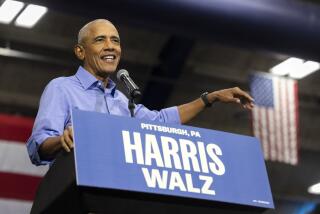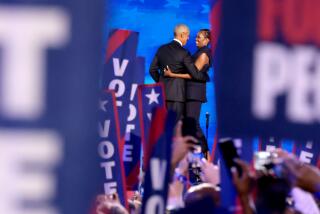A brilliant bad speech
- Share via
In some ways, Barack Obama’s speech on race last week was as brilliant as it was nuanced. But for all its rhetorical beauty, it was also an enormous step backward and, in the end, a rather self-serving call for more discussion about racial grievance in a country that has already done way too much talking.
Until last week, so much of Obama’s appeal lay in the fact that he was not asking us to talk about the racial divide. Instead, he offered himself as a living and breathing symbol of racial reconciliation; his very origins pointed to the goal of unity and, from his own account, created in him a desire to bring together opposing sides.
Throughout the campaign, Hillary Rodham Clinton’s surrogates repeatedly tried to bait Obama into talking about race; they worked to pigeonhole him (and marginalize him) as the “black candidate.” But in the end, it was Obama’s own alliances that tripped him up and obliged him to directly address a subject (one that he now says we “cannot afford to ignore”) that he had so deftly avoided -- or as the Obamaphiles had it, transcended. For all the kudos the Illinois senator has received for his candor, the very act of delivering Tuesday’s address was a defeat. Obama was a much more powerful force for racial progress when he so effortlessly symbolized it, rather than when he called on us to address “old wounds.”
Those who praised the speech did so in part because it acknowledged the grievances that lie on both sides of the nation’s most intractable racial divide. But that’s also what was so wrong with it. The discussion of racial grievance -- and other group grievances -- has long since become an institutionalized part of American life, literally and figuratively. There are advocacy groups, think tanks, foundations and scholars who sometimes have produced groundbreaking work but who also have served to reaffirm the idea that American society is a federation of opposing, static and permanently aggrieved identities. Rather than push us beyond race, the institutionalization of racial identity as defined by grievance perpetuates the divisions of the past. The one new thing Obama’s speech added to the dialogue was the inclusion of whites to the list of aggrieved (and angry) parties.
For all the “complexities of race” Obama sought to grapple with last week, his explicit equivalence of his white grandmother -- who he said had sometimes expressed fear of black men and uttered racial stereotypes -- with the Rev. Jeremiah A. Wright Jr., his race-baiting former pastor, was the most unfortunate.
“I can no more disown him than I can my white grandmother,” he said. But the comparison obscures the fundamental difference in the relationships. Forget the casual moral equivalence he makes between a pastor’s provocative public rants and his grandmother’s private utterances; what’s more important is that grandmothers are inherited while pastors are chosen.
At least one way to explain that choice is that by allying himself with Wright (who presided over his wedding and baptized his daughters), Obama sought to anchor and legitimize himself in Chicago’s black community, which might not have otherwise welcomed an Ivy Leaguer raised in Hawaii by his white mother and grandparents. Without challenging Obama’s claim that Wright “helped introduce [him] to his Christian faith,” his choice was also invariably a political one, and a very bad one at that.
It’s all fine and good that Obama has “condemned” the worst of what he calls Wright’s “wrong” and “divisive” comments, but his refusal to “disown” his former pastor is academic. Part of Obama’s seductive appeal is that he sees political action in terms of sweeping gestures and crusades. Idealistic young people in particular like the idea of being caught up in a wave of change. Obama even ended his race address with yet another of his patented calls to “come together.” In his vision, whites and blacks (and the rest of us!) would move beyond racial discord by fighting common injustices.
But just maybe the complexity of race in contemporary America no longer requires the massive collective action it did half a century ago when blacks in the South were living under Jim Crow, a legal apartheid. Just maybe we don’t have to suffer through yet another national debate on race -- President Clinton launched his fruitless Initiative on Race in 1997 quoting, as Obama did, the preamble to the Constitution. Just maybe more progress will be made if average, fair-minded, decent people simply chose not to associate with -- and lend their credibility to -- haters, extremists or sowers of racial discord. Obama could have taken that simple path any time over the last 20 years. He chose not to. Now it’s too late.
--
grodriguez@latimescolumnists.com
More to Read
Get the L.A. Times Politics newsletter
Deeply reported insights into legislation, politics and policy from Sacramento, Washington and beyond. In your inbox twice per week.
You may occasionally receive promotional content from the Los Angeles Times.










